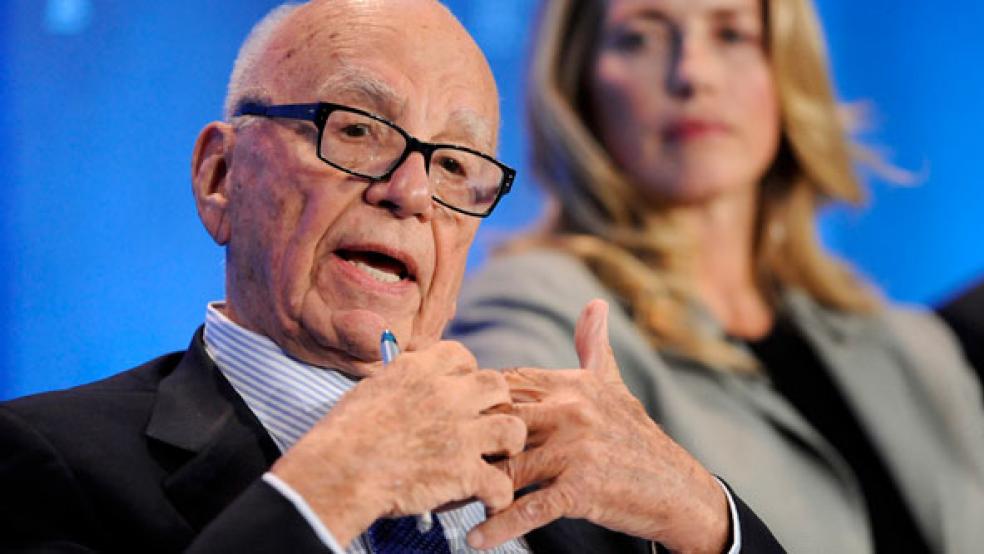The pressure is on 21st Century Fox.
For years, Rupert Murdoch’s shareholders lamented that the company’s stock would perform much better if it wasn’t dragged down by a print-media component. Now that the old News Corp. has formally split in two, with that print publishing division keeping the old name and the movie and TV group renamed Twenty-First Century Fox Inc. (NASDAQ: FOXA), it is put-up or shut-up time for Murdoch’s new old company.

Or, as Murdoch and Co. apparently see it, the perfect time to make an audacious new move by challenging the cable world’s Goliath: ESPN.
The new “Fox,” as Wall Street refers to it, consists of the 20th Century Fox movie and television studio, the Fox Broadcasting Network, Fox News Channel, Fox Business Network, Fox Sports and FX. The publishing operations, including The Wall Street Journal, the New York Post, the Times of London and book company HarperCollins, will now be under the aegis of News Corp. (NASDAQ:NWS), the former name of Murdoch’s company.
With a new structure and name come fresh opportunities, as well as some potential pitfalls. Wall Street is certainly high on the company. A slew of analysts – including those at Bank of America, Credit Suisse, Evercore Partners, Lazard Capital Markets, Morgan Stanley, Needham & Co., Sterne Agee and Wells Fargo – kicked off their coverage of the new company by rating the stock a “buy,” “overweight” or some equivalent. "By divesting its less attractive legacy business, Fox has become a pure-play entertainment company with fantastic assets in its cable channels," Gabelli & Co analyst Brett Harriss told Reuters.
That rampant bullishness doesn’t mean that Fox is clear of questions, though. Can “American Idol,” Fox’s signature primetime television show, which has shown signs of age in the much-followed ratings, regain its momentum? Can its film studio continue to churn out hit after hit? “Titanic,” the 1997 Oscar winner for Best Picture, amassed a staggering $944 million worldwide at the box office, ($1,446.12 in today’s dollars) which helped the parent pay the bills for then-neophyte Fox News Channel. Two decades later, “Avatar,” another James Cameron-helmed Fox film, accumulated a mind-bending $2.3 billion globally, which helped underwrite the fledgling Fox Business Network (as well as those nettlesome print properties). But movie audiences can be fickle and unpredictable. What if Fox’s deep well suddenly dries up for a spell?

Analysts have other questions, too. “Are they going to be good stewards of capital?” asks one buy-side analyst who asked not to be identified by name because of her company’s restrictions on speaking to the media. “It remains to be seen right now. I want to know if this new company is going to invest in ventures with strong ROIs (return on investment). We don’t know if Fox will be acquisitive, either, or what its buyback strategy is going to look like. There are a lot of things for shareholders to consider with this company.”
For Barclays Capital analyst Anthony DiClemente, one key consideration right now is whether Fox shares are truly a bargain at this point. “While we believe in the long-term growth story at Fox, there may be less room for upside near-term,” he recently wrote in a report to investors. DiClemente has an “equal weight” rating on the stock, equivalent to a “hold.”
21st Century Fox already owns one of the highest valuations in the media sector based on projected 2013 earnings. At nearly 21 times those profits, it is more richly valued than Walt Disney, Viacom and Time Warner, and comes in second only to Discovery, according to tallies made by UBS analyst John Janedis. The company now boasts a market capitalization of more than $71 billion. (News Corp., by contrast, has a current market value of about $9.2 billion.)
Perhaps the promise – or, to some observers, the uncertainty -- of the new entity is epitomized by Fox Sports 1, which will be introduced on August 17 in more than 90 million homes as a challenger to ESPN’s global dominance in TV sports programming. The new channel will feature over 5,000 hours of programming that includes college football games, college basketball, NASCAR, soccer and the Ultimate Fighting Championship (UFC). It was probably inevitable that Murdoch would create a sports channel on this scale, challenging Disney’s ESPN juggernaut.
Murdoch has a good reason to believe in the power of sports broadcasting. Remember, it was his far-sighted decision to obtain the rights to the National Football League that jump-started his nascent Fox channel in the 1990s. Murdoch understands that sports broadcasts attract large numbers of the 18-34 male audience that Madison Avenue drools over.
Is it a risk to launch a sports network? Of course, but don’t forget that Murdoch has rolled the dice before, with varying degrees of success. In 1996, when CNN seemed to be at the height of its powers, he unleashed the Fox News Channel. In its first few years on the air, FNC went about finding an audience. Eventually, its head, Roger Ailes, brilliantly tapped the market of conservative voters during the Bill Clinton years, viewers who thought that CNN was too liberal and didn’t speak directly to them.
Before too long, Fox News was the most-watched cable news broadcaster, leaving CNN (and later, liberal-oriented MSNBC) in the dust, from a television ratings perspective. But the six-year-old Fox Business Network has yet to put a scare into well-entrenched CNBC, a Comcast division. Fox Business has gamely tried many formats but hasn’t been able to find a winning formula that will woo viewers away from the channel of Maria Bartiromo and Jim Cramer.
In launching a sports network, Fox is taking aim at an even bigger foe. Fox Sports 1 executives have acknowledged that it will take some time to topple ESPN. They aren’t predicting a first-round knockout. ESPN has invested heavily to lock up valuable sports franchises. It’s even bringing back commentator Keith Olbermann, who had bolted ESPN’s “SportsCenter” broadcast years ago and has reportedly hired numbers guru Nate Silver.
Like any hard-nosed underdog, Fox is not backing down from the challenge. (In gearing up for launch, it has hired Regis Philbin, soon to be 82, to host a show called “Crowd Goes Wild.”) Shrewdly, Fox is using its weapons in this battle, such as its ability to maximize its Super Bowl XLVIII broadcast next Feb. 2, 2014 from MetLife Stadium in East Rutherford, N.J.
“To get one of the valuable ad slots available during the network’s broadcast of the game, sponsors have been told that they must buy time in other Fox Sports content, according to ad buyers – with (an) emphasis on Fox Sports 1,” Variety pointed out.
When it comes to the new 21st Century Fox, analysts like what they see so far. Ultimately, Wall Street believes that Fox has plenty to offer. Sports viewers will find out what it has in store for them next month. For Fox Sports 1 and ESPN, or 21st Century Fox and Disney, it’s game on.






